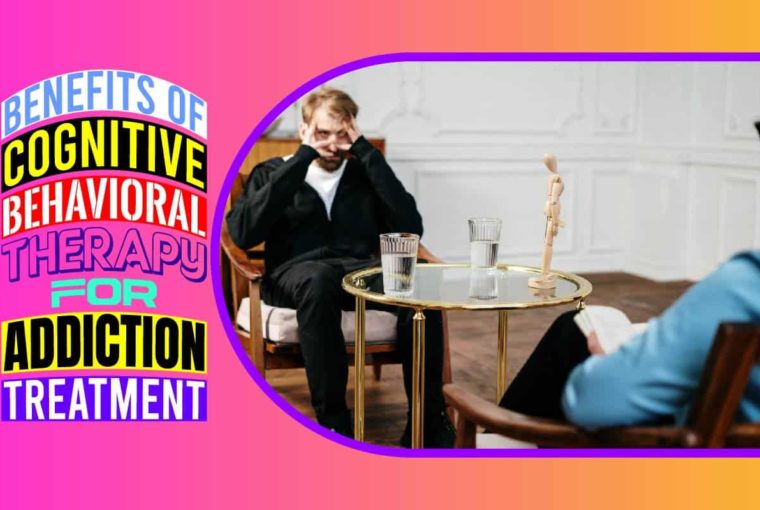Cognitive-behavioral therapy (CBT) is a psychotherapy approach based on the idea that our feelings and behavior respond to our own thoughts, not external factors like other people or events. It is commonly used to help people overcome anxiety, depression, and other mental health issues.
In addition, CBT is considered to be a valuable part of any recovery program for people struggling with addictions. It helps dependent people change their self-defeating thoughts and behaviors that frequently contribute to developing an addiction and learn new, healthier coping mechanisms.
Below, you will find several cognitive-behavioral therapy benefits to help you choose the most effective recovery program possible.
How CBT Works
Cognitive-behavioral therapy (CBT) is based on the premise that our thoughts, feelings, and actions are interrelated. It is a modern approach to psychotherapy. Many of its techniques come from behaviorism (the idea that we learn by imitating and adapting to environmental stimuli) and cognitive psychology (the study of mental processes).
The goal of the CBT approach is to help people identify and change negative thought patterns that lead to unhealthy behaviors.
CBT teaches people how to identify their individual triggers for addictive behavior, such as stress or negative emotions, and develop alternative coping strategies. It also helps individuals challenge unproductive thoughts (often called “cognitive distortions”) and develop healthy thinking habits.
Addicts can also learn how to manage their impulses or urges to engage in addictive behaviors and break the addiction cycle. During treatment, the therapist will work with the client to develop a personalized plan for recovery that considers their individual triggers and learning style (here, you can find more information about CBT as part of a comprehensive recovery plan).
CBT Techniques
CBT’s primary goal is to help addicts identify their problems, deal with them effectively, and create a plan for positive change. Here are some of the most common CBT techniques used during addiction treatment:
Imagery techniques
These involve creating positive images in your mind to motivate yourself to accomplish your goals.
Cognitive restructuring
This technique helps people identify irrational thoughts that lead them towards addiction. It makes people aware of these thoughts and allows them to replace these harmful beliefs with healthier thoughts about themselves.
Reframing
This technique enables people to see things differently when they have an addiction problem. For example, a dependent person can reframe the thought process by reminding themselves that it is not a physiological issue – it is just a habit.
Behavioral experiments
This involves carrying out small tests on yourself in order to change old habits. This approach aims to test your resistance against temptation and reinforce new coping skills.
Relapse prevention
When recovering from an addiction, it is essential to know what triggers your relapse and learn how to avoid these situations. This technique also allows you to understand how to respond to cravings effectively to not lead you back into old habits.
Cognitive-Behavioral Therapy Benefits For Addiction Treatment
In addition to improving your capacity for self-control and breaking destructive habits, CBT offers several benefits for individuals struggling with addictions. Including CBT techniques in your recovery plan can help you:
Improve mental health
CBT has been shown to improve brain function, increase resilience against stress, and restore emotional balance in recovering addicts.
Improve self-awareness
CBT trains individuals to observe their own thoughts and behavior objectively, helping them identify their triggers for addictive behaviour and substance abuse. It also helps them reflect on their decisions and develop more constructive ways of thinking about themselves and their lives. CBT also makes individuals more aware of their feelings towards other people to improve their relationships with friends and family members who are important to them.
Increase motivation
By helping addicts examine their goals objectively, CBT teaches addicts how to be more motivated by these aims while overcoming obstacles along the way. It also allows them to set realistic goals that they can achieve without using drugs or alcohol.
Improve self-control
CBT helps people learn how to control their impulses, manage their stress levels, and work towards their goals without being discouraged by setbacks. It also helps people develop more effective coping mechanisms when they feel the need for a substance.
Conclusion
It is essential to understand that CBT is not a cure for addiction on its own – but it can be used in conjunction with other treatment methods to help you beat your addiction. When dealing with addiction of any kind, it is crucial to get professional help and determine an individual recovery plan. To make sure your addiction treatment will be effective, you should seek recovery programs that include CBT techniques.
Moreover, it helps dependent people not only to combat their current addiction-related problems but also to create new, healthy coping mechanisms to get back to their lives in society, keep themselves motivated in achieving new goals, and increase their self-awareness to prevent any possibility of a relapse.




